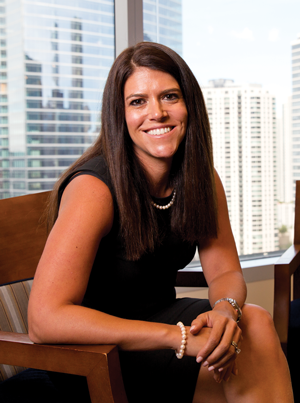Can it be? Fun CLE?

Jennifer Gallinson. Photograph by Wayne Slezak.
Anyone who’s ever been in a law school lecture hall knows the feeling: Your foot has fallen asleep and your mind is wandering to a sunny beach when you realize your coffee cup is empty and drinking more isn’t necessarily going to spark your interest in the lecture at hand.
It doesn’t stop after law school. To retain their licenses, most lawyers must take continuing legal education classes, which are often anticipated with the same enthusiasm as going to the dentist. But firms need their lawyers to stay current, so here are a few strategies being used to lure lawyers to yet another class.
TURN IT INTO A GAME
At Chicago-based Much Shelist, the business development and professional development teams collaborate on cross-office education among different practice groups. Their lawyers might wind up in a game of Construction Karaoke, Bankruptcy Jeopardy or a Halloweenish series on death and taxes—because what could be scarier than estate planning?
Meanwhile, “The Buzz About Our Medical Marijuana Practice,” a summer happy hour session, introduced the firm’s new medical marijuana practice, with “plenty of munchies.”
Much Shelist has about 90 attorneys, with 10 or more new attorneys coming aboard annually, so CLE is an important part of the firm’s attorney development efforts, says Jennifer Gallinson, director of attorney recruitment and professional development.
“We want to give our lawyers an opportunity to learn from one another, and learn more about our different practice areas,” she says.
This might take the form of a “lunch and learn” or a 4 p.m. mixer, but the goal is the same—to “get people from behind their desks and to get to know each other in our various practice areas,” Gallinson says.
“We’re business attorneys, so if our client describes a problem, we don’t want people saying, ‘I’m just a litigator,’ ” she says. “We want them to be able to spot the issues and be better able to identify the client’s problems.”
Much Shelist is drawing about 30 attorneys for each program, which Gallinson says is “very good considering CLE attendance can be hard to come by. Attorneys are competitive by nature, and so harnessing the competitive spirit can make learning fun.”
NO SHOW? NO PROBLEM
Steve Gluckman is a legal learning specialist and CEO of Law Firm Elearning in Bethesda, Maryland, and Toronto. Gluckman says he works with “dozens of law firms” to create on-demand programs lawyers can digest at their own pace without having to be any place in particular.
“It’s getting harder and harder to get people to come to live programming,” Gluckman says. “I remember putting on lunch programs with a pastry chef to get people to come.”
Gluckman says his programs feature bite-size learning. “We try to chunk out the learning, try to divide it up and think outside the box, or outside the hour program.”
Participation can be tracked by including an intermittent pop-up window that requires the user to click within a certain amount of time. “We can then calculate how many of the pop-ups were clicked by the user,” he says. “If it’s a high-enough percentage, we’ll go ahead and record that they completed the module.”
“Finally, we can include a ‘knowledge check exercise’ to make sure they understood the material.”
TURN IT INTO AN EVENT
Stephanie Ball, the Los Angeles-based director of attorney development and recruiting for Best Best & Krieger, is having success with an author series highlighting books that have a hook into a CLE subject.
Her recent lunch program featuring Los Angeles County Superior Court Judge John Kralik, author of 365 Thank Yous: The Year a Simple Act of Daily Gratitude Changed My Life, drew record attendance.
“We have 210 attorneys, and for this program we had 96 turn out. So to get almost 50 percent of the firm attending a CLE—that’s fantastic.” She says Kralik’s book is not only about his personal journey, but about the importance of ethics and civility in the courtroom.
Here are a few of Ball’s rules of CLE success:
• “It has to be something more than just pounding rules and regulations. It’s got to be imaginative and creative. The invitation should be innovative because if you don’t have a hook, they won’t come and find out how great your program is. I included a YouTube video.”
• “You have to make sure how you’re doing the presentation is something different.” In the case of Judge Kralik, his personal story made the class about him and how his story relates to any attorney’s sense of ethics and personal growth.
• “Give them a prize.” In this case, it was a book signed by the author. And here’s a hint: Some educational book publishers will provide a hefty discount for bulk purchases. Authors are likely to be receptive, too, since they’re getting publicity for their book.



